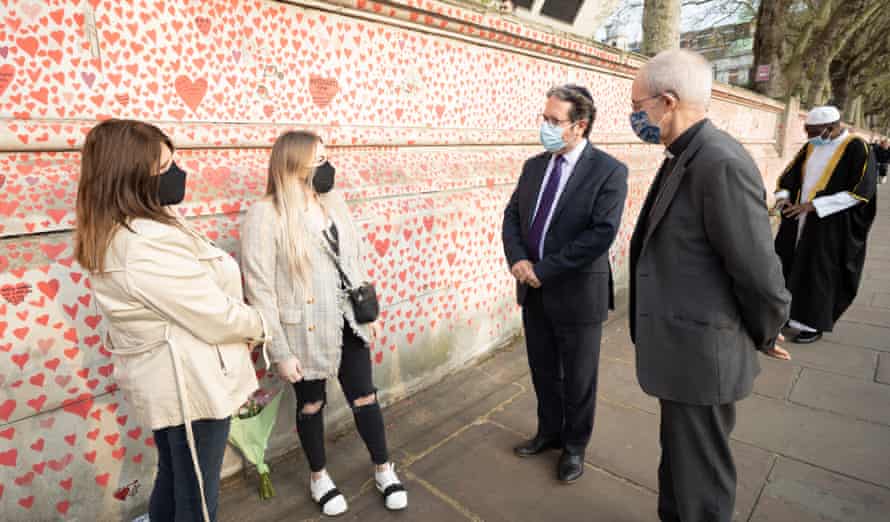The archbishop of Canterbury has called on the government to start a public inquiry into the handling of the Covid pandemic in the UK, saying it should call out “reckless error” and have the power to compel witnesses to attend.
In a move that will reignite pressure on Boris Johnson to finally deliver on a promise to launch an investigation, Justin Welby told the Guardian: “It has got to be an utterly independent statutory public inquiry, that has complete access, that can call witnesses, subpoena them if necessary and if necessary put them under oath.”
“I think we are at the point where they could start doing it,” the archbishop said. “If we ever have anything like this again, a national catastrophe on this scale, what do we do?”
He made the call on Tuesday evening as he met people bereaved by the pandemic at the Covid-19 Memorial Wall on the South Bank of the Thames opposite parliament, where more than 150,000 red hearts have been inscribed in memory of the UK dead. He was joined by Rabbi Daniel Epstein, of the Cockfosters and North Southgate United Synagogue, and Kazeem Fatai, Imam of the Old Kent Road mosque.
Johnson has rebuffed multiple calls from the bereaved, Labour and leading scientists to launch an inquiry immediately. The prime minister told MPs last month that he considered it “an irresponsible diversion” of official time at the moment. Labour has said it wants the inquiry to start as soon as Covid restrictions are lifted.
Welby said that while walking along the 460-metre long memorial he had the sense of “a tidal wave of grief that has not been released”.
“There are 150,000 hearts here,” he said. “That represents a million or more people [grieving]. If you add all the people who died from any cause, none of whom have been able to have a proper goodbye, our estimate is six to eight million people [grieving]. That’s a wartime number. How as a society, as faith leaders do we enable this to be expressed and for healing to be found?
“One of the things people want to know when something goes wrong is that something has been learned from it and mistakes won’t be repeated,” he said. “One of the most comforting things for people that are bereaved is [knowing that] what happened to you, we can do better next time.”
He said a public inquiry should examine the core issues of lockdown timing, PPE provision and the performance of test and trace, as well as exploring more hidden impacts of the pandemic. Care homes, he said “were prioritised by Covid, but unfortunately they didn’t get the attention they should have done”.

“I think it has to be very wide-ranging indeed because this pandemic has been very wide ranging,” he said. “You can break it into sub-groups with a co-ordinating group in the middle. You can do it in two, three or four years, but with interim reports.”
Welby added: “Where there has been serious error, it has to be called out, particularly reckless error. But you won’t get anywhere where the main thing is to apply blame. It has to be [about] lessons learned. You do want people to be able to say ‘I got that wrong and I regret it’ and not to be criticised.”
People he met at the memorial, which was initiated by the Covid-19 Bereaved Families for Justice Group, included Ben Spencer, 43, who lost his father, Brian Spencer, 70, a taxi driver in April last year. He said he wants an inquiry to find out why the initial lockdown came later that it might have done.
“That might have saved so many lives,” he said.
The archbishop also prayed with Courteney Rumball, 20, and her mother, Michelle Rumball, 49, who lost her mother, Violet Partington, 78, in April 2020. They said they wanted an inquiry to examine the advice given by NHS 111 helpline which told Violet to self-isolate for seven days. She died within two days. They also want an investigation of the application of do-not-resuscitate orders, after one was applied to Violet without the knowledge of her family by the hospital where she died.
This content first appear on the guardian
